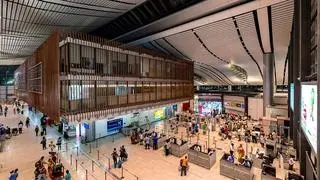Indian ports are up against a problem — a shortage of marine pilots to ensure safe movement of ships within the ports. Given the size and bulk of ships, their movement within the narrow confines of a port is a high-risk operation.
Marine pilots are master mariners who, after a career at sea, join the ports to carry out safe berthing and un-berthing of ships.
The sea passage of a ship ends after the vessel reaches the pilot boarding grounds of its destination port. From there, the pilots navigate them to the assigned berth.
They are, however, a dissatisfied lot. Their low remuneration compared with marine officers on ships leads them to explore lucrative pastures.
EROSION OF STATUS
In the early 1980s, there was a steady stream of pilots to the ports. Shore-based marine officers held the highest positions in ports by virtue of their critical role and their knowledge of cargoes, commercial aspects of shipping and ports worldwide. At that time, the salaries of pilots were comparable with their earlier vocations.
Since then, the salaries of ship masters have increased vis-a-vis that of shore-based marine officers, including pilots.
There has also been a erosion in the status of marine officers. This set the trend for marine officers leaving the port and returning to sea. Seafarers felt discouraged to join the pilotage service, leading to a severe shortage of pilots in ports.
Despite the continued shortage, the Ministry of Shipping has not taken effective steps to address this issue.
As the situation reached alarming proportions, ports began recruiting pilots on a contract basis, offering higher wages than the government-regulated pay scales. But this was only an ad hoc measure, and has not helped resolve the problem.
POOR PROSPECTS
Though a couple of decades late, the Ministry has attempted to address this issue in the latest pay revision orders. But many ports have not been in favour of implementing the revision.
This has resulted in further disillusionment among marine officers, manifested in the recent disruption in marine operations in Kochi Port.
Having been ship masters before, master mariners are well versed in the needs of ships and cargoes in ports. They should be the natural choice to man important posts in ports, as is the case in most private ports and terminals around the country. In government ports, they are kept on par with other port officers and have a limited chances of rising in the bureaucracy, being utilised for pilotage operations only. This has contributed to the exodus of marine officers from the major ports.
Major ports could gain immensely from these officers' vast and varied experience in successfully executing hundreds of charter parties across all oceans, between ports all over the world.
SIGNS OF CHANGE
This realisation is slowly dawning on the ports, after the disruption in the country's busiest port.
Navigational safety and other marine operations have suffered due to the attrition in marine departments in the ports.
Some of the recent recommendations include compensating mariners at market rates and inducting persons with seafaring backgrounds at senior levels in the ports, so that navigational safety aspects of the ports are not compromised.
Other suggestions include training pilots with simulators and navigational aids.
“Now that the problem, its causes and consequences have been identified, it is up to the Government to take steps to ensure that ports recruit and retain pilots in the greater interests of safety in marine operations of the port,” a senior member of this community pointed out.






Comments
Comments have to be in English, and in full sentences. They cannot be abusive or personal. Please abide by our community guidelines for posting your comments.
We have migrated to a new commenting platform. If you are already a registered user of TheHindu Businessline and logged in, you may continue to engage with our articles. If you do not have an account please register and login to post comments. Users can access their older comments by logging into their accounts on Vuukle.